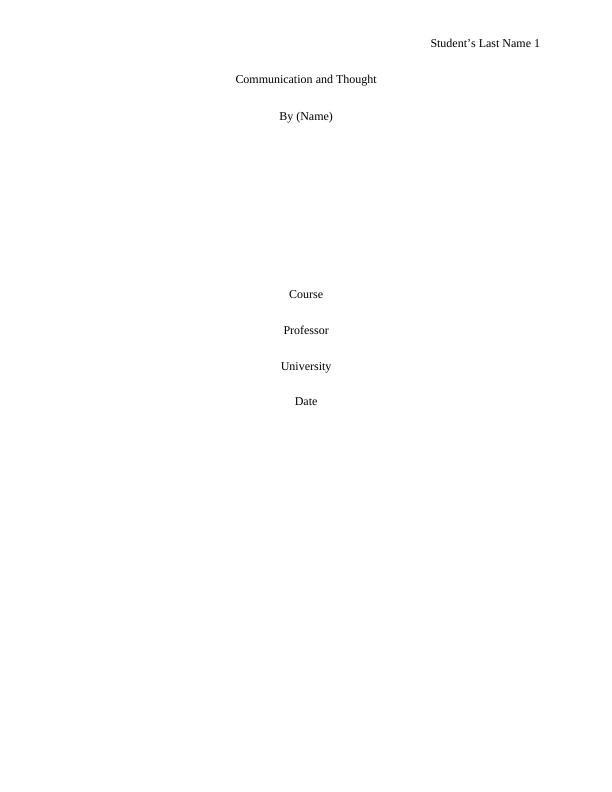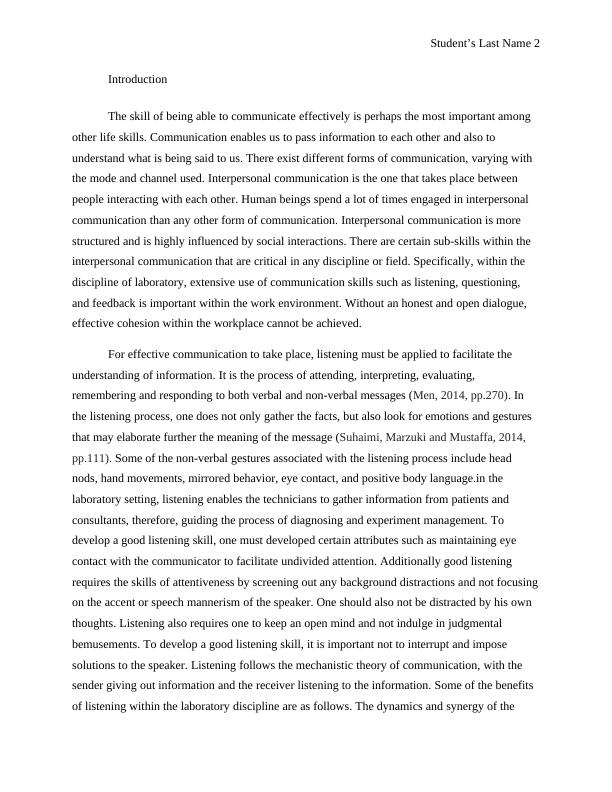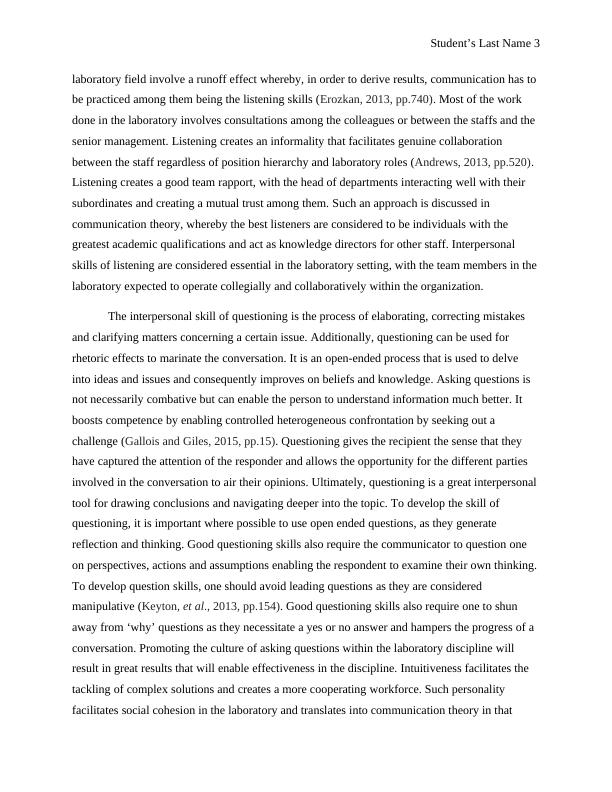Interpersonal Communication Skills in the Laboratory
Added on 2023-01-17
7 Pages1925 Words98 Views
Student’s Last Name 1
Communication and Thought
By (Name)
Course
Professor
University
Date
Communication and Thought
By (Name)
Course
Professor
University
Date

Student’s Last Name 2
Introduction
The skill of being able to communicate effectively is perhaps the most important among
other life skills. Communication enables us to pass information to each other and also to
understand what is being said to us. There exist different forms of communication, varying with
the mode and channel used. Interpersonal communication is the one that takes place between
people interacting with each other. Human beings spend a lot of times engaged in interpersonal
communication than any other form of communication. Interpersonal communication is more
structured and is highly influenced by social interactions. There are certain sub-skills within the
interpersonal communication that are critical in any discipline or field. Specifically, within the
discipline of laboratory, extensive use of communication skills such as listening, questioning,
and feedback is important within the work environment. Without an honest and open dialogue,
effective cohesion within the workplace cannot be achieved.
For effective communication to take place, listening must be applied to facilitate the
understanding of information. It is the process of attending, interpreting, evaluating,
remembering and responding to both verbal and non-verbal messages (Men, 2014, pp.270). In
the listening process, one does not only gather the facts, but also look for emotions and gestures
that may elaborate further the meaning of the message (Suhaimi, Marzuki and Mustaffa, 2014,
pp.111). Some of the non-verbal gestures associated with the listening process include head
nods, hand movements, mirrored behavior, eye contact, and positive body language.in the
laboratory setting, listening enables the technicians to gather information from patients and
consultants, therefore, guiding the process of diagnosing and experiment management. To
develop a good listening skill, one must developed certain attributes such as maintaining eye
contact with the communicator to facilitate undivided attention. Additionally good listening
requires the skills of attentiveness by screening out any background distractions and not focusing
on the accent or speech mannerism of the speaker. One should also not be distracted by his own
thoughts. Listening also requires one to keep an open mind and not indulge in judgmental
bemusements. To develop a good listening skill, it is important not to interrupt and impose
solutions to the speaker. Listening follows the mechanistic theory of communication, with the
sender giving out information and the receiver listening to the information. Some of the benefits
of listening within the laboratory discipline are as follows. The dynamics and synergy of the
Introduction
The skill of being able to communicate effectively is perhaps the most important among
other life skills. Communication enables us to pass information to each other and also to
understand what is being said to us. There exist different forms of communication, varying with
the mode and channel used. Interpersonal communication is the one that takes place between
people interacting with each other. Human beings spend a lot of times engaged in interpersonal
communication than any other form of communication. Interpersonal communication is more
structured and is highly influenced by social interactions. There are certain sub-skills within the
interpersonal communication that are critical in any discipline or field. Specifically, within the
discipline of laboratory, extensive use of communication skills such as listening, questioning,
and feedback is important within the work environment. Without an honest and open dialogue,
effective cohesion within the workplace cannot be achieved.
For effective communication to take place, listening must be applied to facilitate the
understanding of information. It is the process of attending, interpreting, evaluating,
remembering and responding to both verbal and non-verbal messages (Men, 2014, pp.270). In
the listening process, one does not only gather the facts, but also look for emotions and gestures
that may elaborate further the meaning of the message (Suhaimi, Marzuki and Mustaffa, 2014,
pp.111). Some of the non-verbal gestures associated with the listening process include head
nods, hand movements, mirrored behavior, eye contact, and positive body language.in the
laboratory setting, listening enables the technicians to gather information from patients and
consultants, therefore, guiding the process of diagnosing and experiment management. To
develop a good listening skill, one must developed certain attributes such as maintaining eye
contact with the communicator to facilitate undivided attention. Additionally good listening
requires the skills of attentiveness by screening out any background distractions and not focusing
on the accent or speech mannerism of the speaker. One should also not be distracted by his own
thoughts. Listening also requires one to keep an open mind and not indulge in judgmental
bemusements. To develop a good listening skill, it is important not to interrupt and impose
solutions to the speaker. Listening follows the mechanistic theory of communication, with the
sender giving out information and the receiver listening to the information. Some of the benefits
of listening within the laboratory discipline are as follows. The dynamics and synergy of the

Student’s Last Name 3
laboratory field involve a runoff effect whereby, in order to derive results, communication has to
be practiced among them being the listening skills (Erozkan, 2013, pp.740). Most of the work
done in the laboratory involves consultations among the colleagues or between the staffs and the
senior management. Listening creates an informality that facilitates genuine collaboration
between the staff regardless of position hierarchy and laboratory roles (Andrews, 2013, pp.520).
Listening creates a good team rapport, with the head of departments interacting well with their
subordinates and creating a mutual trust among them. Such an approach is discussed in
communication theory, whereby the best listeners are considered to be individuals with the
greatest academic qualifications and act as knowledge directors for other staff. Interpersonal
skills of listening are considered essential in the laboratory setting, with the team members in the
laboratory expected to operate collegially and collaboratively within the organization.
The interpersonal skill of questioning is the process of elaborating, correcting mistakes
and clarifying matters concerning a certain issue. Additionally, questioning can be used for
rhetoric effects to marinate the conversation. It is an open-ended process that is used to delve
into ideas and issues and consequently improves on beliefs and knowledge. Asking questions is
not necessarily combative but can enable the person to understand information much better. It
boosts competence by enabling controlled heterogeneous confrontation by seeking out a
challenge (Gallois and Giles, 2015, pp.15). Questioning gives the recipient the sense that they
have captured the attention of the responder and allows the opportunity for the different parties
involved in the conversation to air their opinions. Ultimately, questioning is a great interpersonal
tool for drawing conclusions and navigating deeper into the topic. To develop the skill of
questioning, it is important where possible to use open ended questions, as they generate
reflection and thinking. Good questioning skills also require the communicator to question one
on perspectives, actions and assumptions enabling the respondent to examine their own thinking.
To develop question skills, one should avoid leading questions as they are considered
manipulative (Keyton, et al., 2013, pp.154). Good questioning skills also require one to shun
away from ‘why’ questions as they necessitate a yes or no answer and hampers the progress of a
conversation. Promoting the culture of asking questions within the laboratory discipline will
result in great results that will enable effectiveness in the discipline. Intuitiveness facilitates the
tackling of complex solutions and creates a more cooperating workforce. Such personality
facilitates social cohesion in the laboratory and translates into communication theory in that
laboratory field involve a runoff effect whereby, in order to derive results, communication has to
be practiced among them being the listening skills (Erozkan, 2013, pp.740). Most of the work
done in the laboratory involves consultations among the colleagues or between the staffs and the
senior management. Listening creates an informality that facilitates genuine collaboration
between the staff regardless of position hierarchy and laboratory roles (Andrews, 2013, pp.520).
Listening creates a good team rapport, with the head of departments interacting well with their
subordinates and creating a mutual trust among them. Such an approach is discussed in
communication theory, whereby the best listeners are considered to be individuals with the
greatest academic qualifications and act as knowledge directors for other staff. Interpersonal
skills of listening are considered essential in the laboratory setting, with the team members in the
laboratory expected to operate collegially and collaboratively within the organization.
The interpersonal skill of questioning is the process of elaborating, correcting mistakes
and clarifying matters concerning a certain issue. Additionally, questioning can be used for
rhetoric effects to marinate the conversation. It is an open-ended process that is used to delve
into ideas and issues and consequently improves on beliefs and knowledge. Asking questions is
not necessarily combative but can enable the person to understand information much better. It
boosts competence by enabling controlled heterogeneous confrontation by seeking out a
challenge (Gallois and Giles, 2015, pp.15). Questioning gives the recipient the sense that they
have captured the attention of the responder and allows the opportunity for the different parties
involved in the conversation to air their opinions. Ultimately, questioning is a great interpersonal
tool for drawing conclusions and navigating deeper into the topic. To develop the skill of
questioning, it is important where possible to use open ended questions, as they generate
reflection and thinking. Good questioning skills also require the communicator to question one
on perspectives, actions and assumptions enabling the respondent to examine their own thinking.
To develop question skills, one should avoid leading questions as they are considered
manipulative (Keyton, et al., 2013, pp.154). Good questioning skills also require one to shun
away from ‘why’ questions as they necessitate a yes or no answer and hampers the progress of a
conversation. Promoting the culture of asking questions within the laboratory discipline will
result in great results that will enable effectiveness in the discipline. Intuitiveness facilitates the
tackling of complex solutions and creates a more cooperating workforce. Such personality
facilitates social cohesion in the laboratory and translates into communication theory in that

End of preview
Want to access all the pages? Upload your documents or become a member.
Related Documents
Effective Communication Skills in Academic and Professional Contextslg...
|7
|1671
|69
Analysis of Non-Verbal Communicationlg...
|6
|504
|346
Importance of Communication Skills : Reportlg...
|10
|1968
|89
Effectiveness of Communication Skills in Academic and Professional Contextslg...
|7
|1522
|72
Interpersonal Communication Skills in Accountinglg...
|7
|1767
|195
Interpersonal Communication: Barriers, Strategies, Listening, Conflict, Intercultural Communicationlg...
|11
|1209
|496